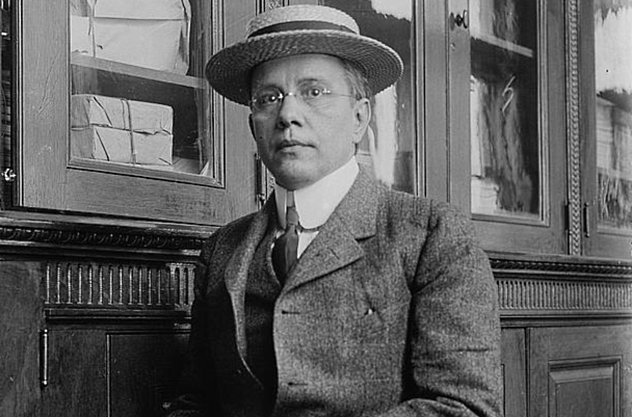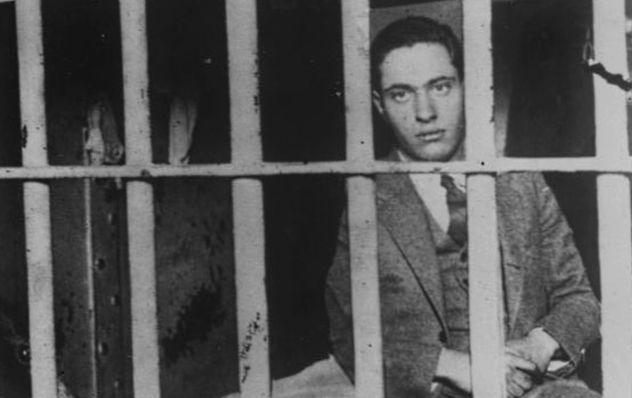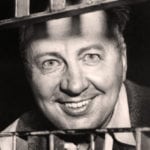 History
History  History
History  Weird Stuff
Weird Stuff 10 Wacky Conspiracy Theories You Will Need to Sit Down For
 Movies and TV
Movies and TV 10 Weird Ways That TV Shows Were Censored
 Our World
Our World 10 Places with Geological Features That Shouldn’t Exist
 Crime
Crime 10 Dark Details of the “Bodies in the Barrels” Murders
 Animals
Animals The Animal Kingdom’s 10 Greatest Dance Moves
 Movies and TV
Movies and TV 10 Box Office Bombs That We Should Have Predicted in 2025
 History
History 10 Extreme Laws That Tried to Engineer Society
 History
History 10 “Modern” Problems with Surprising Historical Analogs
 Health
Health 10 Everyday Activities That Secretly Alter Consciousness
 History
History 10 Dirty Government Secrets Revealed by Declassified Files
 Weird Stuff
Weird Stuff 10 Wacky Conspiracy Theories You Will Need to Sit Down For
 Movies and TV
Movies and TV 10 Weird Ways That TV Shows Were Censored
Who's Behind Listverse?

Jamie Frater
Head Editor
Jamie founded Listverse due to an insatiable desire to share fascinating, obscure, and bizarre facts. He has been a guest speaker on numerous national radio and television stations and is a five time published author.
More About Us Our World
Our World 10 Places with Geological Features That Shouldn’t Exist
 Crime
Crime 10 Dark Details of the “Bodies in the Barrels” Murders
 Animals
Animals The Animal Kingdom’s 10 Greatest Dance Moves
 Movies and TV
Movies and TV 10 Box Office Bombs That We Should Have Predicted in 2025
 History
History 10 Extreme Laws That Tried to Engineer Society
 History
History 10 “Modern” Problems with Surprising Historical Analogs
 Health
Health 10 Everyday Activities That Secretly Alter Consciousness
10 Infamous Criminals After Their 15 Minutes Of Fame
Fame can be a very fickle mistress. One day, everybody knows who you are, and the next, everyone is wondering whatever happened to that guy whose name they can’t quite remember. This is true for criminals, as well. Although some might believe that there’s no better way to become famous than crime, that fame doesn’t last long, except for a few rare cases. This is a look at the other guys—the ones who quickly faded into obscurity after their 15 minutes of fame were up.
10 Michael Fagan
For most of his criminal career, Michael Fagan maintained an unimpressive resume. That all changed in 1982, when for a brief moment, Fagan became the most talked-about person in England. All he did was break into the queen’s bedroom.
One could hardly call Michael Fagan a criminal mastermind, but he was able to break into Buckingham Palace not once, but twice, and he just hung around for a bit. The second time, he made the mistake of wandering into the queen’s bedroom and coming face-to-face with Her Majesty. According to the story that was widely circulated at the time, the queen had to spend several minutes with Fagan until the guards arrived, although Fagan later clarified that the queen left the room immediately in search of guards.
At the time, trespassing was not considered a criminal offense, so Fagan only spent six months in a psychiatric ward. Afterward, he continued his life of crime, getting charged with indecent exposure, assault, and conspiracy to distribute heroin—nothing as exciting as startling the queen. However, he did try to make full use of his fame. In 2011, he appeared in a Banksy documentary covering Fagan’s famous felonious past. Most bizarre of all, in 1983, Fagan attempted a music career, launching a cover of the Sex Pistols’ “God Save the Queen.”
9 Bruce Reynolds
The Great Train Robbery of 1963 is the stuff of legend, without a doubt one of the most famous heists in history. On August 8, 1963, a gang of 15 criminals (with the help of an inside man) robbed a Royal Mail train of £2.6 million, over £40 million in modern currency. The heist was extensively covered by the media even though most of the people involved were caught quickly. Ronnie Biggs became the face of the Great Train Robbery, probably because the mastermind, Bruce Reynolds, managed to escape to Mexico City.
After moving around from city to city, Reynolds returned to England and was finally arrested in 1969. He was released from prison in 1978, although he returned for three years in 1980 on a drug charge. Afterward, he enjoyed a reputation as a famous former criminal which, according to Reynolds, prevented him from finding employment both legally and illegally. He wrote an autobiography, which detailed the heist, and served as a consultant on the movie Buster, based on the life of fellow train robber Buster Edwards. He also made a few appearances for the band Alabama 3 because his son, Nick, is a member. Incidentally, the band is best known for creating the theme music to The Sopranos. Reynolds died in 2013.
8 Bernhard Goetz
Vigilantes are always a mixed bag regarding the media coverage that they receive. Some people consider them heroes, others demonize them, and some think they’re normal people who’ve been pushed too far. That was the case with Bernhard Goetz back in 1984, when he shot four young men who tried to mug him. The “Subway Vigilante,” as he was known in the press, came to symbolize people’s struggles with the high crime rates of 1980s New York, as well as the increasing racial tensions. Eventually, Goetz was convicted with criminal possession of a firearm and served eight months.
Although reluctant at first, Goetz eventually learned to embrace his newfound fame. He made a few small appearances in movies, TV, and radio before opening his own electronics store called Vigilante Electronics. Goetz also made an attempt at a political career, running for mayor of New York in 2001 and advocating the legalization of marijuana.
In his spare time, Goetz also took to looking after small, furry residents of New York City—squirrels. He started out with a makeshift squirrel infirmary, and he now builds and installs squirrel houses alongside other volunteers.
7 Harry Kendall Thaw

Although mostly forgotten today, the trial of Harry Kendall Thaw in 1906 whipped the media into the frenzy, becoming one of the few cases to earn the moniker “trial of the century.” Thaw was charged with the murder of Stanford White, a man competing for his wife’s affections, model Evelyn Nesbit.
Thaw was a millionaire playboy, son to one of the richest men in the country. White was a hugely successful (albeit much older) architect, and Evelyn Nesbit was a popular model who never met a camera that she didn’t love. Harry Thaw had a history of mental illness, unlimited resources, and the best lawyers that money could buy. He was found innocent by reason of insanity, or “Dementia Americana,” as the tabloids described it. Thaw was sentenced to life incarceration in a mental hospital, but his lawyers started work on getting him out as soon as possible.
Thaw walked free from the asylum in 1915. It didn’t take long for him to get into trouble again. In January 1917, Thaw was on the run from police for kidnapping and whipping a 19-year-old man. He was declared insane and locked in an asylum but got out again in 1924.
This time, Thaw settled down in a farming community in Virginia, where he became known as the local rich eccentric. He unsuccessfully tried to get into the movie business and wrote his memoirs in 1926. He remained unapologetic for White’s murder: “Under the same circumstances, I’d kill him tomorrow.”
6 Tonya Harding
The 1994 scandal surrounding disgraced figure skater Tonya Harding is part of US pop culture. Her involvement in the assault of rival skater Nancy Kerrigan by her ex-husband and his friends ensured that Harding was barred for life from the sport she loved. So naturally, she had to find new sources of revenue.
She took advantage of her newfound infamy with a classic move—the sex tape. Reportedly, Harding and then-husband Jeff Gillooly were each paid $200,000 for the sex tape by Penthouse. This was followed by an eclectic range of career choices. Tonya appeared at a wrestling show, working as a manager. She had a one-off musical performance with her band, the Golden Blades. She starred in the 1996 action film Breakaway and made numerous TV appearances as herself. She became a color commentator for a “funny home videos” show called World’s Dumbest . . .
For a while, it looked like the new career that would eventually stick would be boxing. After making an appearance in 2002 on the Fox show Celebrity Boxing, where she beat Paula Jones, Harding announced that she would go professional. She made her debut in 2003, losing by decision to Samantha Browning. Harding’s boxing career ended a year and a half later due to complications from asthma. She finished with a 3–3–0 record.
5 Heidi Fleiss
One of the most scandalous trials to entertain us during the mid-1990s was that of Heidi Fleiss, a notorious madam who provided high-class escorts for Hollywood’s rich and famous. After a lengthy and publicized trial, Fleiss was convicted of pandering and tax evasion and spent the next few years in jail and halfway houses.
After her release from prison, Fleiss managed to find several legitimate business avenues, such as a columnist for Maxim and a guest commentator for Fox News. However, she still remained a controversial figure who made headlines for the wrong reasons, such as her violent relationship with actor Tom Sizemore and her struggles with prescription medication.
Some of Fleiss’s business ventures made full use of her past. She wrote several books on prostitution and released a DVD called Sex Tips alongside model and friend Victoria Sellers. In 2010, Fleiss appeared as a contestant on Celebrity Big Brother, but she was the second housemate to be eliminated. She also opened a sex shop in Los Angeles and planned to open a legal brothel in Nevada, but those plans fell through.
4 Nathan Leopold

In 1924, two wealthy, educated students named Nathan Leopold and Richard Loeb were responsible for a heinous crime. The pair killed 14-year-old Bobby Franks out of a desire to commit the perfect murder. They didn’t succeed and were apprehended soon after. Their parents’ wealth was enough to retain the services of renowned lawyer Clarence Darrow, who gave a passionate 12-hour speech that secured life in prison for Leopold and Loeb instead of a death sentence.
Loeb was killed by another inmate in 1936. While in prison, Leopold tried to behave as a model inmate. He spent his free time learning new languages. He worked in the prison hospital and in the school. He reorganized the prison’s education system and even volunteered to be infected with malaria to test a new vaccine.
The Leopold and Loeb case was huge in the media and served as inspiration for many stories, including the 1929 Patrick Hamilton play Rope and the subsequent Alfred Hitchcock movie. During the 1950s, a writer named Meyer Levin wanted Leopold’s cooperation for a novel called Compulsion, based on the crime. Leopold refused and tried to have its release blocked. He did the same thing with the movie based on the book and even released his own autobiography in 1958. It was criticized for deliberately overlooking areas of interest, particularly Leopold’s childhood and details about the actual murder. After 34 years in prison, Leopold was released on parole, and he spent the rest of his life in Puerto Rico, where he married and taught mathematics.
3 Linda Kasabian
The 1969 Manson murders were a gruesome endnote to the decade of love. Charles Manson orchestrated nine murders, including that of actress Sharon Tate, which were carried out by his followers, known as the Manson Family. This was all done in an attempt to trigger a race war known as Helter Skelter. Simply put, this event had all the ingredients necessary to turn it into a media frenzy.
Manson and the rest of his followers who were involved with the murders have spent or will likely spend the rest of their lives in prison. Other “family” members have gone to jail for lesser crimes. There is one notable exception, though—Linda Kasabian. She was the family member who testified against the others in exchange for immunity for being the getaway driver at both crime scenes. Consequently, she provided the prosecution with all the gory, sordid details regarding the killing spree, which ensured everyone else’s conviction.
Understandably, after the trial, Kasabian wanted to put the whole thing behind her, but unsurprisingly, the media disagreed. Her story was just too juicy to let go. Kasabian changed her name and moved around to avoid media scrutiny and only gave one interview between 1969 and 2008. It wasn’t until 2009 that Cineflix found her living in a trailer park while making a documentary on Manson. Since then, Kasabian has opened up and discussed the murders on several occasions. That’s also when she found out that there was a band named after her.
2 Jon Venables
One of the most gruesome crimes in England’s history occurred in 1993 when Jon Venables and Robert Thompson, both 10 years old, kidnapped, tortured and killed two-year-old James Bulger. They were imprisoned, but both were released in 2001 when they turned 18. They were also granted new identities and lifelong protection under the Mary Bell order. However, this has not stopped people from frantically trying to find the new identities of the notorious killers.
Images purportedly showing an adult Venables have surfaced online multiple times. The attorney general’s office interfered and issued an injunction against any photos allegedly showing Venables or Thomson as adults. Several people were fined or jailed for breaking this injunction, even on social media. This was done not only to protect the killers, but also innocent men wrongly accused of being Venables, who could become targets for vigilantes.
While Thomson has managed to keep out of the spotlight, Venables has been in the media several times. First, he was rearrested for breaking the conditions of his parole. In 2010, he was jailed for several years for unspecified charges regarding child pornography. Lately, Venables has caused a sensation again after tabloids claiming to know his identity (but being unable to declare it) reported that he is active on dating sites where women have no way of knowing his dark past.
1 Issei Sagawa
As far as shocking crimes go, few can top that of Issei Sagawa. In 1981, while a student in Paris, Sagawa killed a woman named Renee Hartevelt and spent the next three days eating her body. Although he was soon caught, his father’s wealth, as well as bureaucratic loopholes between France and Japan, ensured that Sagawa would only spend a few years in a mental hospital before walking out a free man.
As if that wasn’t disturbing enough, Sagawa became a semi-celebrity in Japan. He would often make appearances as a guest commentator at various events, where he talked about the murder and cannibalism like someone discussing politics or a good movie. Speaking of which, in addition to TV shows and documentary appearances, Sagawa made his acting debut in 1992 in an exploitation film where he played a sadistic voyeur. He also wrote dozens of books on a variety of topics, and perhaps most disturbingly, was even hired by a magazine as a food critic to review restaurants.
Today, Sagawa laments his own fate. He argues that he received the harshest punishment possible of having to live and make a living in normal society, where everyone perceives him as a monster. At the same time, he readily admits he still has the same urges and that he would like to eat a willing participant, as long as she’s a young, beautiful woman.
Radu is a history/science buff with an interest in all things bizarre and obscure. Say hi on Twitter or check out his website.








